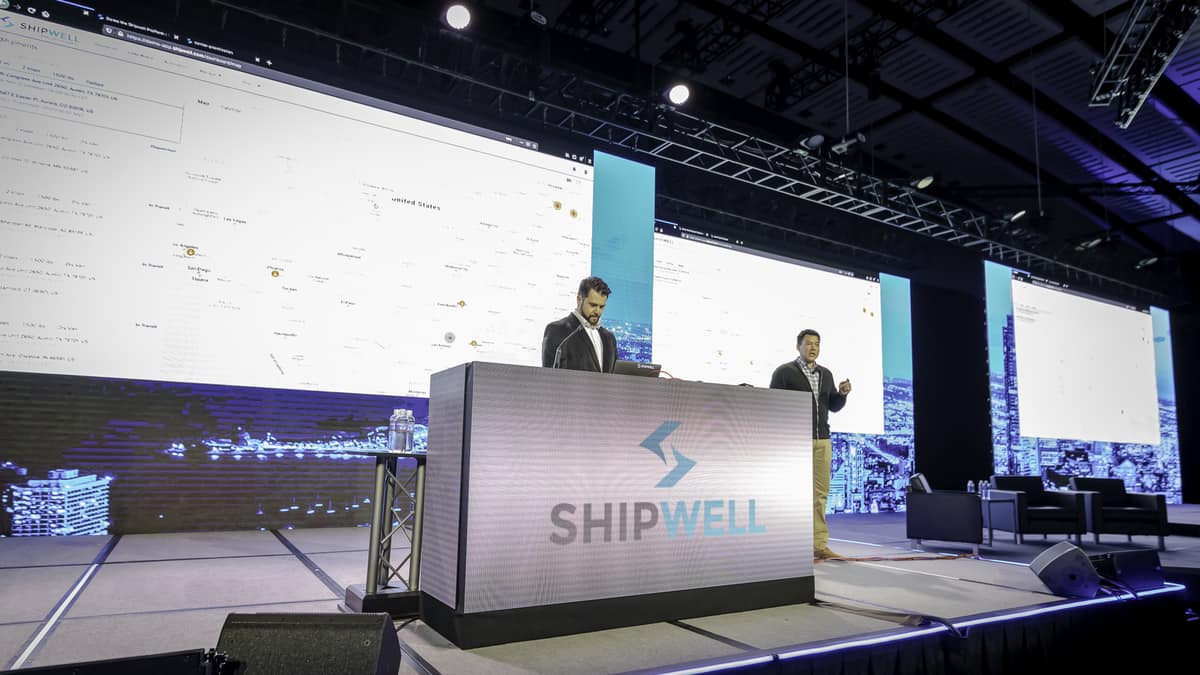The status quo has changed forever as the likes of Amazon cast their increasingly long shadows. Shippers “need new tools to keep up with increasing velocity,” asserted Jason Traff, president and co-founder of Shipwell, a company providing new tools that allow medium-sized players to keep pace with their larger rivals.
The holy grail is to transform the shipping process from a liability to an asset — “a competitive advantage rather than just a cost center,” he explained.
“With Amazon, whether or not a product is eligible for Prime shipping affects how customers see the product. Shipping is part of the product details. The shipping experience has become part of the brand experience,” said Traff.
Shipwell — which took the Number 21 spot in the FreightTech25 awards at November’s FreightWaves LIVE event in Chicago — provides a platform that utilizes AI and machine learning and allows shippers to better compete in the new ecommerce world where it’s not simply about cutting costs, but also about providing customers with an “Amazon-like experience.”
“We have a cloud-based web platform built on top of a REST API that connects and brings a shipper’s entire supply chain into synch,” he explained. “We’re focused on empowerment — on creating a better experience for everybody.
“We bring in all their carriers and 3PLs and we connect to as many of their systems as possible, and through a combination of visibility, workflow automation and business intelligence, we can really bring them to the next-level shipping experience.”
Shipwell was founded in Austin, Texas in 2016. It raised $2.1 million in seed funding in 2017, $10 million via its Series A funding round in October 2018, and $35 million in Series B in October 2019.
“Right now, our customer mix is about 50-50 between shippers and 3PLs and we have around 500,000 carriers set up in the platform,” said Traff, who noted that the primary target is medium-sized shippers with annual revenues in the $200 million-$700 million range and shipping spend of $10 million-$100 million.
“Our average user will hit a 20x return on investment in the first 12 months through a combination of increased sales, reduced inventories and optimization of hard and soft costs,” he maintained, adding that the platform “is generally being used by two different types of people.”
The first group is comprised of individuals working for a shipper “who are involved in the day-to-day transportation of goods and need the visibility to know where the shipments are so they can be proactive at spotting the ones that could be a problem.”
The second group is comprised of executives at very large companies who are unsure of what they’ve spent on shipping “because they have very large decentralized shipping networks and it is hard to know what the numbers are,” said Traff. For these clients, “it’s very powerful to have the visibility to instantly provide the number of shipments and how much the spend is.”
Asked by FreightWaves about Shipwell’s current revenues and what Series B proceeds will be spent on, he replied, “This was a great year for us. We saw 10x revenue growth in 2019. As we look ahead, we’ll be ramping up our sales and engineering teams in 2020. The size of our sales and engineering teams is roughly going to triple.”
He continued, “We had our start with the over-the-road domestic market, but what we’re finding is that by focusing on ‘middle-mile’ transportation, we’re getting pulled closer to ‘first mile’ and to ‘last mile.’ To provide the best value for the shipper and give them an end-to-end experience on one platform, looking at other modes and other geographies would be very in line with our value proposition. That’s very much within our focus.”
Asked about competition, he replied, “Our biggest competition is always just apathy. It’s this idea that supply chains have worked this way for 20-plus years and they’re doing fine and you don’t need to worry about them.
“But I do see this shifting over time and I think we’ll be on the right side of history. People are starting to realize that the way you did these things 10 years ago is not going to work 10 years from now. And they’re realizing that if they didn’t start changing 10 years ago, they’d better start today, because doing things differently is going to be really important as you start looking into the future.”











Dave
Why would a 3PL use them? They are just a broker (MC #983885) like any other. I would never use them as they would steal my customers. And if I was a shipper why would I use a broker TMS platform as they are just interested in moving my freight by charging me more than the open market. As a shipper I don’t want my broker in my shorts, seeing my freight and my rates. Duh.